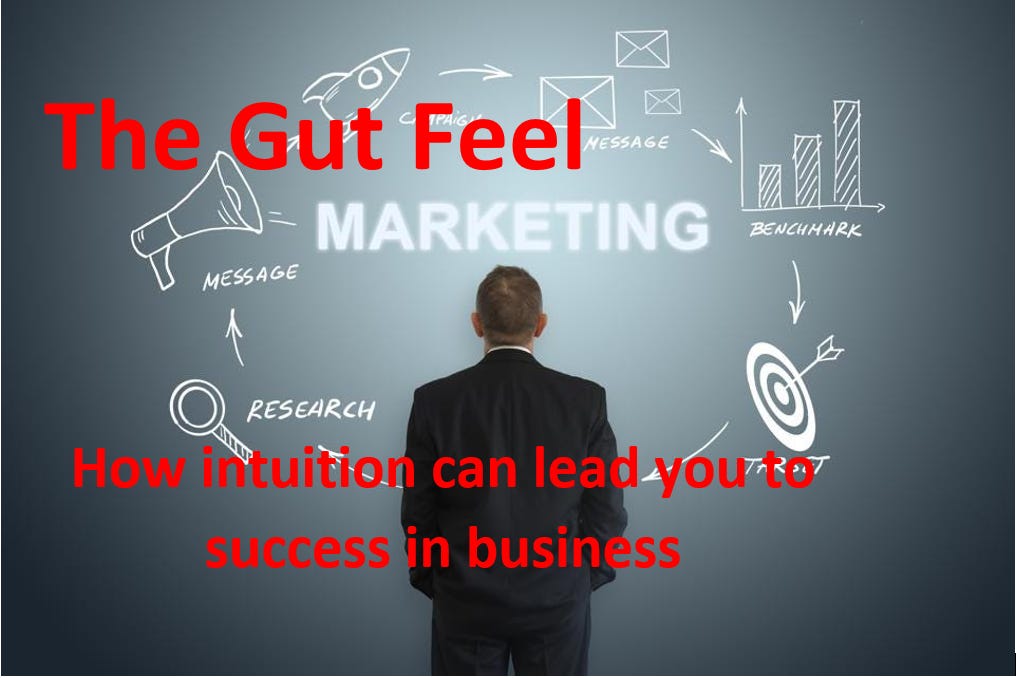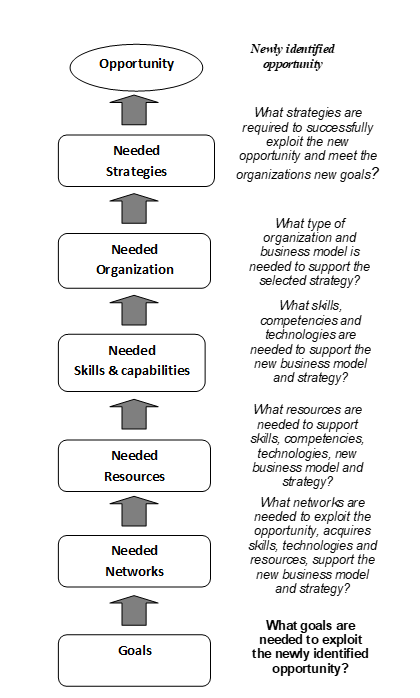The Gut Feel: How intuition can lead you to success in business
Chapter Five: Intuition and Marketing
Chapter Five
Entrepreneurial marketing is very different from conventional marketing in that resources and information are lacking to make informed decisions. Intuition is thus very important, where most breakthrough ideas are the result of intuition rather than market research. The key to entrepreneurial marketing is flexibility and experimentation until one has found the best combination of the best products, services, events, and strategies. To achieve this flexibility stubbornness and ego must be transcended with intuition. Finally to develop one’s place in the market, an entrepreneur must examine the opportunity they have seen carefully, and configure their strategies with relevant resources to support it.
Intuition and Marketing
Marketing for an established firm and an entrepreneurial start-up is as different as chalk and cheese. Established firms usually have recognised brands, stable channels of distribution, dedicated marketing personnel, and fixed budgets to carry out their activities, while entrepreneurial start-ups usually have none of these at their disposal and are starting from scratch. An entrepreneurial start-up venture with very limited resources must create what established companies already have under very vulnerable conditions. If your competitors notice that you exist and you look like being a potential threat, they are likely to come down on you like a ‘ton of bricks’.
Entrepreneurial marketing has become the flavor of the month where the general message is that ‘you have to get more with less’. Most of you would have heard of terms like viral advertising, viral marketing, and guerilla marketing. All these methods are aimed at getting publicity and into the market in ways that require small amounts of resources. You have to go back to the basics of doing your own brochures and distributing, giving out samples where customers are, using social and other free forms of media, getting publicity in some way or another, generally undertaking activities that require time as the major resource. These are very effective where your market is localized or specifically segmented and less effective as the market spreads out to the general community.
An effective entrepreneur marketer is someone who thinks in creative ways about how to maximize publicity and get promotional mileage for the new venture’s products with very limited resources. Again this requires imagination, and intuitive innovative approaches to marketing and promotion.
As we saw in the introduction of the book, one has to really understand the market, products, customers, competitors, the supply chain, methods of promotion, etc., to really develop any reliable intuition. This means rolling up your sleeves and getting down to the market until it metaphorically ‘runs in your blood’. Then you begin to develop the wisdom about the market that will give you advantage over those snotty nosed MBA types employed by the large companies who are more interested in the next rage over the weekend than why customers buy their company’s products. This is called the intuitive advantage that gives deep insight into the market that larger companies have lost and don’t have (in many cases, not all).
With the intuitive advantage you sense your moves rather than think about them. New ways of promotion, new products and product extensions become something you sense rather than something your rationally think out. I watched my father think up the concept of a continuous air freshener with a silk flower on top, which he named Flower Gel which today would look corny. Many doubted him, but the launch went ahead and it for a while became the best selling air freshener on the Australian market. There was no way that any rationally based market research could have told him whether the concept would be successful or not. Winners like this can only be the product of intuition.
Excuse the pun, you smell success and you go for it – there is no way of rationalizing it out. Please rationalize for me why one restaurant can be incredibly successful, while another next door can be a terrible failure. We have landed on the moon, but we are still not sure why one concept can be successful while others are dismal failures. Thomas Edison, John Rockefeller, Henry Ford, Ray Kroc, Bill Gates, Steve Jobs and Steve Wozniak, Michael Dell, Jerry Yang and David Filo, Jeff Bezos, and more recently Mark Zuckerberg all have one thing in common. None of them did any formal market research before they started their ventures. All were acts of intuition.
The process of being an entrepreneur is about moving from being a market outsider where things look all mysterious to take the inside running of the market where you make your decisions from the gut; just like all the above did. This is where the big changes can occur. Who would have ever thought that milk we drank at school (yes it got quickly sour in the sun) would one day be “sexy Big M” (go and have a look at the original ads on You Tube) or one of the other adult brands now in the market. This could not have been a rational act, only an intuitive one. Who would have thought that one day we would use our mobile phones to take the family snaps. Who would have thought that we would have 24 hour news, movie, sports, drama, and educational programs coming down by satellite into our homes. These ideas didn’t come from detailed market analysis, they came from the gut. This is the power of intuition in the market.
Intuition Matches Dreams with Reality in the Marketplace
The aim of marketing is to either attract consumers away from existing products, or create new sources of value. Therefore the key to success is finding new sources of value consumers will accept. This is heavily dependent on intuitive thinking but not a straight forward process. Before any start-up an entrepreneur usually visualizes something they have in mind for the market. When an entrepreneur launches a new product, rarely if at all, do consumers “beat a path to your door.” Extensive modifications to products are usually required during the initial marketing process, both before and after introduction to the market.
This difference between what the entrepreneur visualizes and what the consumer will accept can only be bridged through intuition. Intuition drives an entrepreneur’s flexibility to change their ideas about the products, events, or services they offer to the market. Without this intuitive flexibility, there would be many more failed ventures because of stubbornness to change when original ideas are not accepted. To do this successfully means transcending the ego.
This is how entrepreneurs learn what consumers really want through the trial and error process. One case in point is a boutique handmade chocolate manufacturer in Collingwood called Mámor Chocolates. The company was recently established by the proprietor Hanna Frederick producing the most superb Hungarian style handmade chocolates. However sales through retail outlets and markets were very poor around Melbourne. Hanna started organizing tasting events which really became an instant success and today Mámor is a very popular “word of mouth” promoted organizer of events which sell lots of chocolate.
Intuition is what guides the entrepreneur about what the consumer wants, as very little meaningful market research can be done to assist in making these types of decisions, especially with the types of concepts outlined above.
Developing Your Place in the Market
As mentioned in the last section, marketing is about attracting consumers away from existing products, or finding a new niche or position where “new” value can be created for the customer. Once this opportunity has been identified, one can go about creating the strategy chain that will best serve your purpose based on what resources, skills and capabilities, and networks you have available. The steps in this process are shown in figure 5.1. below.
Figure 5.1. The steps involved in creating your place in the market.
If one is able to match the opportunity with the right strategy correctly, there is little direct competition, and there are a sufficient number of consumers who see the product or service as providing some new form of value for them, then the new venture may have a rapid rise to success. Just look at the success of the iPad.
Marketing is about flexibility which allows evolution, but the big breakthroughs are made through intuition. Undertaking market research to determine that more people like red rather than blue packaging will never create any future breakthroughs that intuition will. After all the automobile, airplane, motorbike, home computer, notebook, Pizza Hut, and KFC, were all products built upon intuition rather than analysis. The second issue is that stubbiness blocks intuition and evolution of the market which is where new opportunities come from.
Summary
· The modus operandi of entrepreneurial and conventional marketing is very different.
· Entrepreneurial marketing requires imaginative and intuitive innovative approaches to marketing and promotion.
· Entrepreneurial marketing can be a very effective tool in a local area, but becomes more difficult as the market area grows.
· You really have to develop an in-depth understanding of the market to operate with intuitive advantage within it.
· Most of the great market successes were based on intuition.
· The aim of marketing is to either attract consumers away from existing products, or create new sources of value.
· Entrepreneurs have to work hard initially to get consumers to accept new products and usually have to modify their concepts through trial and error and intuition.
· To be flexible in the marketplace, you must transcend your ego and stubbornness. This is where entrepreneurs really learn what consumers want. Market research is of little help in this matter.
· Entrepreneurs must find new niches to establish themselves within and then align their strategies with the opportunity, with coordinated resource, capability, and network support.
Some More Intuition and the market Tips:
· Learning the Market: The more intricate your knowledge about the market is the better intuition you will develop about it. Learn in detail; who are the competitors? How big and powerful are they? What products do they have? What range of extensions and varieties do they have? What are the price ranges? What positions are there in the market? Where can you buy the products? Etc., etc, etc. Learn the market until you start to feel it and sense what changes are happening. After some time you will be able to anticipate what will happen – this is when your intuition kicks in.
Next chapter: Chapter Six: Intuition and Sales
Click on subscribe so articles can be directly emailed to your inbox:





